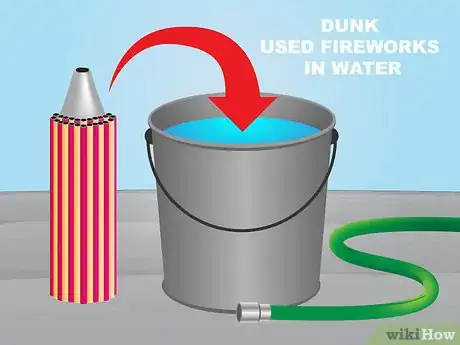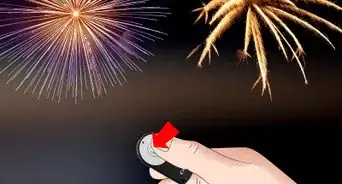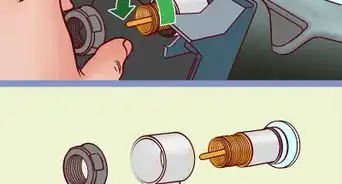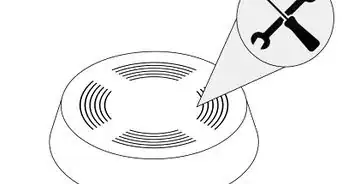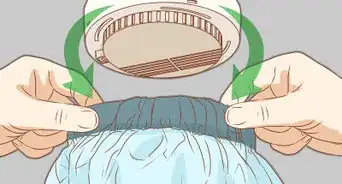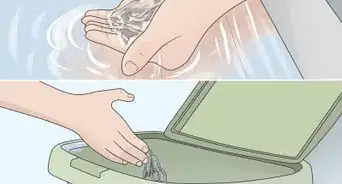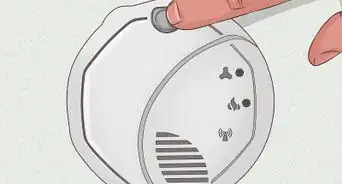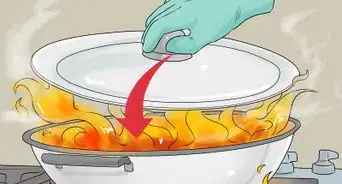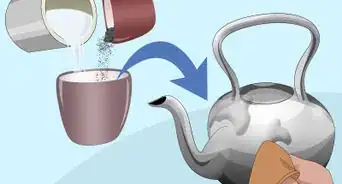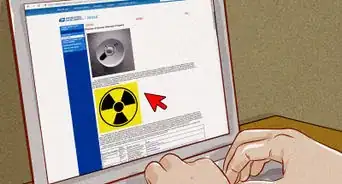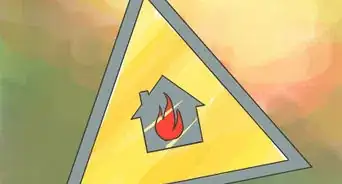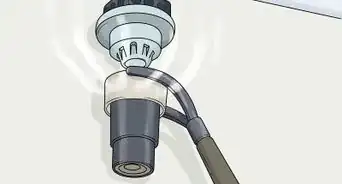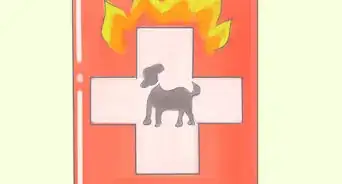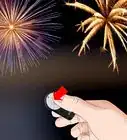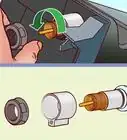This article was co-authored by wikiHow Staff. Our trained team of editors and researchers validate articles for accuracy and comprehensiveness. wikiHow's Content Management Team carefully monitors the work from our editorial staff to ensure that each article is backed by trusted research and meets our high quality standards.
This article has been viewed 86,306 times.
Learn more...
Spent fireworks and "duds" remain hot after use. If you don't handle them carefully, they can spark fires and cause serious injury. Always keep water on hand, and be prepared to extinguish any fires that start. Soak fireworks in water after use. Then, wrap them in plastic and bring them to a local solid waste center. Be smart and be safe!
Steps
Soaking Fireworks
-
1Prepare a water source. Before you light any fireworks, make sure that you have a water source on hand. Fill a couple of buckets with water to dunk used fireworks and put out fires. Keep a hose or a fire extinguisher nearby. In a pinch, you can pour a bucket of soil or sand over a fire to extinguish the blaze – but water will be most effective.
-
2Dunk fireworks in water after use. Submerge them in a large bucket of water until they are thoroughly cooled and all of the embers have been extinguished. Soak for at least fifteen minutes, and soak overnight if possible. This applies to all spent fireworks, "dud" fireworks, and sparklers.
- For extra safety, soak the fireworks from a distance. Pour water from a bucket, or spray the explosives using a garden hose.
- It's important to soak even the fireworks that don't go off. Sometimes, "duds" explode late, causing fire or injury. Never try to relight a "dud" – wait 20 minutes after the failed detonation, and then soak the explosive in water.
- Remove the fuse from live fireworks. If you are trying to dispose of fireworks that have not yet been lit, make sure to pull off the wicks so that the explosives won't detonate.
Advertisement -
3Do not soak fireworks in or near a natural body of water. The compounds that are used to make the colorful explosions contain metals that can pollute the air, water, and surrounding ecosystem. Furthermore: if you set off fireworks near the surface of a body of water, the concussion can kill fish and other local wildlife. If your fireworks do explode above a body of water, make sure to promptly remove any visible debris from the explosive shell.[1]
Disposing of Fireworks
-
1Pick up all debris. After your firework show, comb the area for any pieces that may have scattered in the explosion. Watch the fireworks as they fall to the ground, and mark their locations so that you don't miss anything. If you leave a piece of burning material on the ground, you might start a fire! Furthermore, fireworks often contain metals and other materials that can pollute an ecosystem and contaminate the water table.[2] Do your part to minimize your impact.
-
2Wrap the soaked fireworks. Use trash bags, Ziploc, or plastic wrap so that the wet explosives don't dry out.[3] Consider double-wrapping the bags. It's okay to put multiple fireworks in the same bag, as long as it is sealed.
-
3Place fireworks in regular household trash. Fireworks cannot be recycled or composted.[4] If possible, bring the fireworks to your local solid waste center. Make sure to tell the workers at the waste center that you are disposing of fireworks – and whether they are live, spent, or duds.
- If you don't feel comfortable placing fireworks in the garbage, contact your local fire department. Some police and fire authorities will take fireworks and ensure proper disposal. This applies especially to live fireworks.
Community Q&A
Did you know you can get answers researched by wikiHow Staff?
Unlock staff-researched answers by supporting wikiHow
-
QuestionWhat happens if the fireworks get wet in storage?
 wikiHow Staff EditorThis answer was written by one of our trained team of researchers who validated it for accuracy and comprehensiveness.
wikiHow Staff EditorThis answer was written by one of our trained team of researchers who validated it for accuracy and comprehensiveness.
Staff Answer wikiHow Staff EditorStaff AnswerThe fireworks are no longer viable once they get wet. Fireworks must be kept in a sealed, dry container, and stored in a dry, low-humidity area to ensure their long-term utility. Wet fireworks remain a potential hazard as they may still explode, so handle with care when moving them to be soaked and disposed of. After soaking, double bag them to keep them wet, then dispose of in the outdoor trash.
wikiHow Staff EditorStaff AnswerThe fireworks are no longer viable once they get wet. Fireworks must be kept in a sealed, dry container, and stored in a dry, low-humidity area to ensure their long-term utility. Wet fireworks remain a potential hazard as they may still explode, so handle with care when moving them to be soaked and disposed of. After soaking, double bag them to keep them wet, then dispose of in the outdoor trash. -
QuestionHow long should I soak used fireworks for before disposal?
 wikiHow Staff EditorThis answer was written by one of our trained team of researchers who validated it for accuracy and comprehensiveness.
wikiHow Staff EditorThis answer was written by one of our trained team of researchers who validated it for accuracy and comprehensiveness.
Staff Answer wikiHow Staff EditorStaff Answer
wikiHow Staff EditorStaff Answer -
QuestionAre old fireworks safe to use?
 wikiHow Staff EditorThis answer was written by one of our trained team of researchers who validated it for accuracy and comprehensiveness.
wikiHow Staff EditorThis answer was written by one of our trained team of researchers who validated it for accuracy and comprehensiveness.
Staff Answer wikiHow Staff EditorStaff AnswerIf stored well sealed in a dry place of very low humidity, and they are intact and undamaged, old fireworks should be safe to use. However, if old fireworks have been exposed to water or you can see visible damage, such as loose fuses, dented cones, lost fins, missing sticks, etc., then it is time to dispose of them. If the fireworks have been subjected to moisture/water or have been damaged, dispose of them appropriately or take them to your local fire station for proper disposal; handle with great care! If old fireworks that have been stored dry and kept intact fail to light, do not approach them for 30 minutes, then soak them and dispose of them as outlined in the article above.
wikiHow Staff EditorStaff AnswerIf stored well sealed in a dry place of very low humidity, and they are intact and undamaged, old fireworks should be safe to use. However, if old fireworks have been exposed to water or you can see visible damage, such as loose fuses, dented cones, lost fins, missing sticks, etc., then it is time to dispose of them. If the fireworks have been subjected to moisture/water or have been damaged, dispose of them appropriately or take them to your local fire station for proper disposal; handle with great care! If old fireworks that have been stored dry and kept intact fail to light, do not approach them for 30 minutes, then soak them and dispose of them as outlined in the article above.
Warnings
- Wear gloves to protect your hands. If you'll be lighting the fireworks yourself, consider wearing safety goggles to protect your eyes.[5]⧼thumbs_response⧽
- Point fireworks away from you and others in case they discharge.⧼thumbs_response⧽
- Do not let children handle fireworks.⧼thumbs_response⧽
- Use fireworks sensibly.⧼thumbs_response⧽

